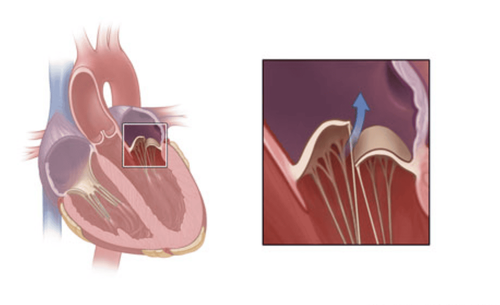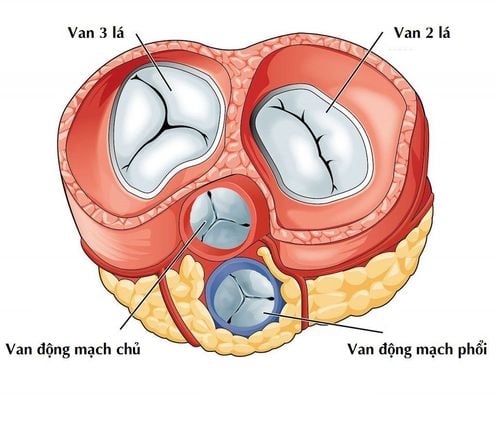This is an automatically translated article.
Heart valves play an important role in helping to push blood through the circulatory system. However, due to a number of causes, the heart valves can be damaged, mild or severe degeneration, requiring surgery to replace the heart valve. Let's find out when to need surgery for mitral regurgitation, mitral stenosis through the article below.1. When should heart valve replacement surgery be performed?
The mitral valve acts like a "door" located between the left ventricle and the left atrium. During diastole, the mitral valve opens, allowing blood to flow easily from the left atrium to the left ventricle. During systole, when the left ventricle pumps blood into the aorta, the mitral valve closes to prevent blood from flowing back into the left atrium.Patients need surgery to replace the heart valve in the following cases:
1.1. If the mitral valve is not fully opened, it will make it difficult for blood to flow to the left ventricle, resulting in stasis and increased pressure in the left atrium, if maintained for a long time, the left atrium will be dilated and increased pressure pulmonary veins and pulmonary arteries.
Patients with mitral stenosis too tight often have signs of shortness of breath on exertion, if not treated, the shortness of breath will increase even at rest. Mitral stenosis also leads to acute episodes of dyspnea (acute pulmonary edema, cardiac asthma), arrhythmias, atrial fibrillation and cerebrovascular accident (due to blood clots from the heart).
Regarding the treatment direction, if the mitral stenosis is simple, the doctor may prescribe balloon dilatation. If mitral stenosis is accompanied by mitral regurgitation or the valve is too thick and calcified, the doctor will recommend surgery to replace the heart valve.
1.2. Mitral regurgitation is a condition in which the two valves of the heart do not close properly, leading to a backflow of blood from the left ventricle into the heart chambers instead of being transported to the circulatory system. The more mitral regurgitation, the more work the left ventricle has to do, and over time it will dilate, leading to heart failure. There are many causes of mitral regurgitation such as: mitral valve prolapse, rheumatic heart disease, valvular degeneration, infection in the heart, congenital valve regurgitation, physiological valve regurgitation ...
People with heart valve regurgitation 2 leaves often present with dyspnea on exertion or echocardiography with reduced EF (<60%). Depending on the extent of damage to the valve and the ligament and muscle system, the doctor will appoint mitral regurgitation surgery
In general, surgery to replace an artificial heart valve or repair a heart valve is the necessary treatment when Heart valves have been severely damaged, the chambers of the heart are enlarged, affecting the function of the heart. The repair or replacement of a new heart valve will help treat the root of the disease, help patients reduce symptoms, prevent arrhythmias and prevent complications such as heart failure, stroke, and help prolong life. patient life.

Phẫu thuật hở van tim 2 lá là hướng điều trị cần thiết khi van tim bị tổn thương
2. Contraindications
The results of heart valve replacement surgery depend on many factors, of which there are 2 highlights that affect the surgical results:Degree of heart valve damage: many patients detect and treat the disease at an advanced stage. The stage is late, when the heart failure is severe and there are many systemic disorders. Equipment of the hospital, the facility performing the surgery: valve replacement surgery or valve repair are major surgeries and should be performed in full conditions with the most advanced medical equipment. In addition, no matter how damaged the valve is, it should be cautious when appointing surgery, especially when there are clinical and laboratory parameters as follows:
Severe heart failure, inability to respond or respond very slowly to aggressive medical treatment. Prolonged heart failure, physical exhaustion, impaired liver and kidney function. On ultrasound, left ventricular function was severely reduced: ejection fraction (FE) less than 40%, contraction fraction less than 25%. Left ventricular dilatation greater than 80mm. Patients with other contraindications to surgery such as: existing infection in other organs, severe chronic disease, blood disease...
3. Is replacing an artificial heart valve dangerous?
Any surgery carries risks, and heart valve replacement surgery is no exception. After surgery, the patient still encounters some dangerous and uncommon complications such as:Infective endocarditis: a condition in which bacteria enter the body, enter the bloodstream, cause organ infection, and cause heart valve ulceration. . Bleeding from an overdose of anticoagulants: Patients with mechanical heart valve replacement must take anticoagulants for life to prevent blood clots from forming on the valve, which can lead to many risks such as bleeding, bleeding. gastrointestinal bleeding, brain hemorrhage,... Patients should note that, even if the above side effects occur, the abrupt discontinuation of anticoagulants must also be approved by a doctor. Thrombosis on the valve: often occurs in mechanical valves, causing valve blockage if anticoagulation is not maintained. Stroke: A fairly common condition after heart valve replacement surgery, this is caused by a thrombus around the mechanical valve that dislodges, blocking a blood vessel in the brain. Myocardial infarction is an extremely serious complication that can cause death in a short time. Myocardial infarction can happen very suddenly and without obvious signs. Re-stenosis, prosthetic valve regurgitation: can appear on both mechanical and biological valves. For mechanical heart valves, it is mainly due to thrombus formation on the valve, while biological valves are due to the process of valve degeneration over time. Therefore, patients after heart valve replacement surgery need to arrange their lifestyle, moderate and scientific activities and adhere to treatment so as not to affect the life of the heart valves and the heart.
Currently, Vinmec International General Hospital is one of the most prestigious medical treatment units for cardiovascular diseases in Vietnam. The Cardiology Department of Vinmec always receives much praise and satisfaction from domestic & international customers. As a pioneer address to successfully apply the world's most advanced techniques in the treatment of cardiovascular diseases.
A team of highly qualified and experienced specialists: Medical doctors with qualifications from Master to Professor, Doctorate, reputable in medical treatment, surgery, interventional cardiac catheterization. Intensive training at home & abroad. In particular, Prof. TS.BS Vo Thanh Nhan - Cardiology Director of Vinmec Central Park was recognized as the first and only expert in Vietnam to be awarded the "Proctor" certificate on TAVI. State-of-the-art equipment, comparable to major hospitals in the world: The most modern operating room in the world; The most modern silent magnetic resonance imaging machine in Southeast Asia; The CT machine has a super-fast scanning speed of only 0.275s/round without the use of drugs to lower the heart rate; The 16-sequence PET/CT and SPECT/CT systems help detect damage to the cardiovascular organs early even when there are no symptoms of the disease. Applying the most advanced advanced cardiovascular techniques in the world in treatment: Painless open heart surgery; Percutaneous aortic intervention without general anesthesia; Treatment of mitral regurgitation through the catheter has a success rate of 95%; Ventricular-assisted artificial heart transplantation for patients with end-stage heart failure prolongs quality of life beyond 7 years. Cooperation with leading Cardiology Centers in Vietnam and the world such as: National Heart Institute, Cardiology Department of Hanoi Medical University, University of Paris Descartes - Georges Pompidou Hospital (France), University of Pennsylvania (France), University of Pennsylvania United States)... with the aim of updating the most modern cardiovascular treatments in the world. To be examined and treated with leading Vinmec cardiologists, please book an appointment online at the website or contact Vinmec Health System nationwide for service.
Please dial HOTLINE for more information or register for an appointment HERE. Download MyVinmec app to make appointments faster and to manage your bookings easily.













